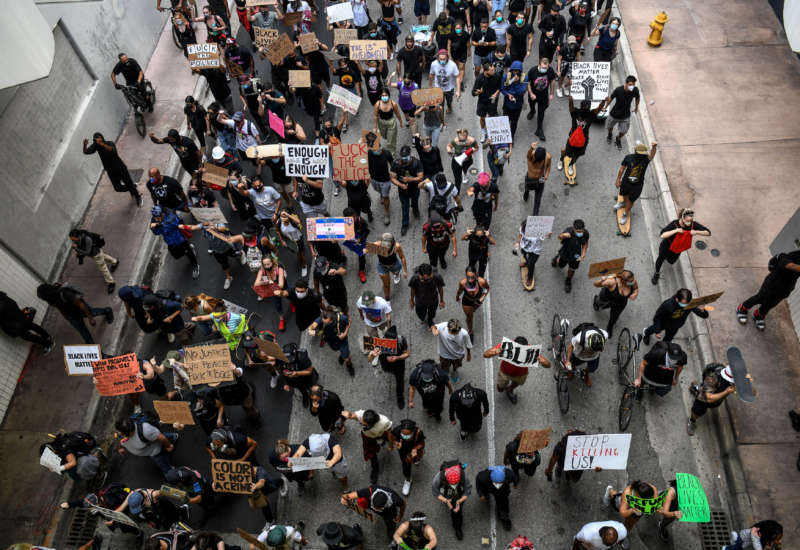In the past year, following last summer’s uprising against racial injustice, Republican-led legislatures across the South have created new criminal penalties for protesters, some of which could empower police to conduct mass arrests if even a single protester creates a risk of property damage.
Those new laws are part of a broader nationwide crackdown against protests. According to the International Center for Not-for-profit Law, 45 states have considered and 36 states have enacted new anti-protest laws since January 2017, a year that saw massive actions against the Dakota Access Pipeline and the Trump administration. Among the Southern states that have passed such laws in that time are Alabama, Arkansas, Florida, Kentucky, Louisiana, Mississippi, Tennessee, Texas, and West Virginia, with others pending in Alabama, Georgia, North Carolina, South Carolina, Tennessee, and Texas.
Florida’s new law, signed by Gov. Ron DeSantis (R) in April, is particularly harsh. It created new riot-related felonies and also invented the new crime of “mob intimidation,” which lawmakers defined as a group of people trying to compel another person to, among other things, “maintain a particular viewpoint.” It carries a penalty of up to a year in prison.
During a legislative hearing about the measure earlier this year, state Sen. Dianne Hart (D) argued it would impact people of color who were exercising their constitutional right to protest. Ben Frazier, a community leader in Jacksonville, warned that under the new law, “Martin Luther King would’ve never been able to march in Selma to Montgomery, across the Edmund Pettus Bridge.”
Questions have been raised about whether people participating in ongoing Miami protests against Cuba’s communist government will be arrested for violating the law. Hundreds of protesters marched down one of the city’s busiest thoroughfares this week, but they weren’t cited for violating the new law, which prohibits blocking roads.
Meanwhile, a new Kentucky law makes it a crime to insult police officers or deride them with gestures that tend “to provoke a violent response.” Two new Arkansas laws toughen the penalties for blocking traffic, defacing monuments, and trespassing on oil and gas pipelines. The Tennessee House passed a bill that would have imposed a potential six-year prison sentence for obstructing a sidewalk, but it didn’t move in the Senate.
Civil liberties advocates are already challenging some of these new laws in court, charging they violate the First Amendment. In May, a federal judge declined to dismiss a lawsuit challenging a Louisiana law that drastically toughened penalties for trespassing on “critical infrastructure,” which includes oil and gas pipelines.
And after DeSantis signed the Florida bill into law, a coalition of civil rights groups immediately sued the state. A federal judge ordered mediation in the case to be completed by late November, but the state is fighting the order, saying it would not be “a worthwhile use of the parties or the court’s resources.”
Detaining Protesters in Alabama?
In Alabama, the state House and Senate couldn’t agree on anti-protest legislation this year, but lawmakers recently pre-filed a bill for next year’s session. Its Republican sponsor, Rep. Allen Treadaway, retired last year as Birmingham’s assistant police chief.
Treadaway claimed that his bill, which is similar to the version passed by the House this session, isn’t about “infringing on First Amendment rights, it’s just about the safety of everybody involved and that includes protesters.” But the Democratic leader in the House argued the bill “could have a very chilling effect on someone’s right to protest.”
Under the pre-filed bill, a person commits the crime of “riot” by assembling in a way that “creates an immediate danger of damage to property” and defies a curfew or “order to disperse” from police. The bill also redefines “incitement to riot” to include anyone who funds or “aids” a riot. Both offenses would carry a mandatory 30-day sentence. The measure would also require that anyone arrested for riot or obstructing traffic be imprisoned for up to 24 hours with no bail.
In addition, the Alabama bill would punish cities that reduce funding for police by withholding all of their state funding. And it creates a new felony, “assault against a first responder,” that leads to a mandatory six-month sentence.
Given the broad language in the legislation, a person could serve six months in prison for “attempting” to spit on a police officer or “dogs or horses employed by a law enforcement agency,” which jt defines as first responders.
Cops, Corporations Back Lawmakers
Police officer unions and associations have supported anti-protest laws in Arkansas, Florida, North Carolina, and other states. According to Connor Gibson, who researched the laws on behalf of the Piper Fund, police officers or their labor unions have spoken out in favor of anti-protest bills in 13 states in the past year.
In 19 states where anti-protest bills have been introduced since last June, former law enforcement officers acted as sponsors, as with the Alabama bill. The Southern States Police Benevolent Association based in Georgia was the top law enforcement donor to anti-protest bill sponsors, contributing $39,300.
Many of the legislators sponsoring the new laws are also backing new voter suppression bills that will make it harder to vote. A new report from Greenpeace called it “a two-pronged attack on democracy.”
Five of the top 10 corporate donors to sponsors of anti-protest bills are also among the top 10 donors to sponsors of voter suppression bills. They include AT&T, headquartered in Dallas, and two tobacco companies, Virginia-based Philip Morris and R.J. Reynolds headquartered in North Carolina. AT&T has also donated more than half a million dollars to the various campaigns of Texas Gov. Greg Abbott, a champion of the anti-protest legislation.
While AT&T recently affirmed its commitment to supporting laws that make voting easier, it has been criticized for both the size of its campaign contributions and what The Intercept characterized as its “lackluster attempt” to address the movement for racial justice.


